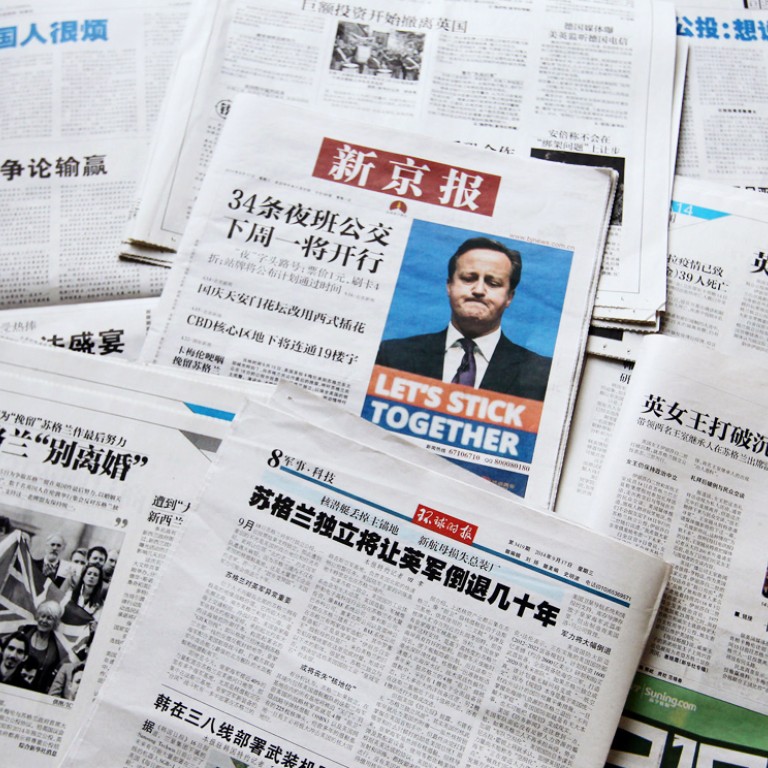
Beijing wary of Scottish vote's impact on Taiwan, Tibet, even Hong Kong
There has been no official comment, but experts say the issue of self-determination is a tricky one
Beijing is closely watching and assessing the impact of Scotland's referendum on independence from the United Kingdom.
There has been no official comment, although the public have shown some curiosity. Media reports have been mostly factual, with some saying the vote could boost pro-independence movements that might cause Europe to disintegrate.
Stephen Notman, a Scot who works in the whisky trade in China and who returned home to vote, said some of his Chinese friends were comparing Scotland to developments in Taiwan, Xinjiang and Tibet. They also wondered whether Chinese people would need a separate visa.
Another Scot in Beijing, Stephen Nashef, an English teacher, said some of his Chinese friends regarded the referendum as "strange and weird".
"I suppose Britain is considered a powerful and successful country. Many people here might find it strange that some [members of the country] want to break it up," he said.
Foreign Ministry spokesman Hong Lei said he would not comment because it was another country's internal affairs.
But Premier Li Keqiang told British Prime Minister David Cameron when visiting London in June that China wanted to see a "strong, prosperous and united United Kingdom".
Observers said the issue was tricky for Beijing because it could encourage discussion of whether the "people's choice" should decide the fate of Taiwan, Tibet and even Hong Kong.
"From the Chinese official perspective, the People's Republic of China has never been kind to the idea of such referendums for Taiwan or anywhere else within what's considered Chinese territory," said Dali Yang, a professor of political science at the University of Chicago.
Titus Chen Chih-chieh, a professor of international relations at National Chengchi University in Taiwan, said the implications for Hong Kong and Taiwan were a serious concern.
"The mainland obviously does not want to see how the Scottish decide their fate to be an example for Taiwan and Hong Kong," he said.
On Monday, an editorial in the , published under the , said Cameron's decision two years ago to approve the referendum was "too imprudent and he will become a 'sinner' of the United Kingdom if Scotland gains independence".
"If national self-determination has become a paramount principle overwhelming everything else, Europe will constantly break up into smaller and smaller fractions, which will run counter to European integration," it said.
Shi Yinhong , a professor of international relations at Renmin University, said independence would require Beijing to adjust trade ties with Britain and divert economic cooperation to Scotland.
China's direct investment has increased in Scotland and has mainly involved the acquisition of mineral resources and energy, figures from the Scottish government show.
State-owned PetroChina invested US$1.015 billion in 2011 in a joint venture operating oil refineries in Scotland and France.
Su Hao , a professor with China Foreign Affairs University in Beijing, said China would follow if the United Kingdom recognised the independence of Scotland, but that did not mean China recognised the legitimacy of such referendums.

